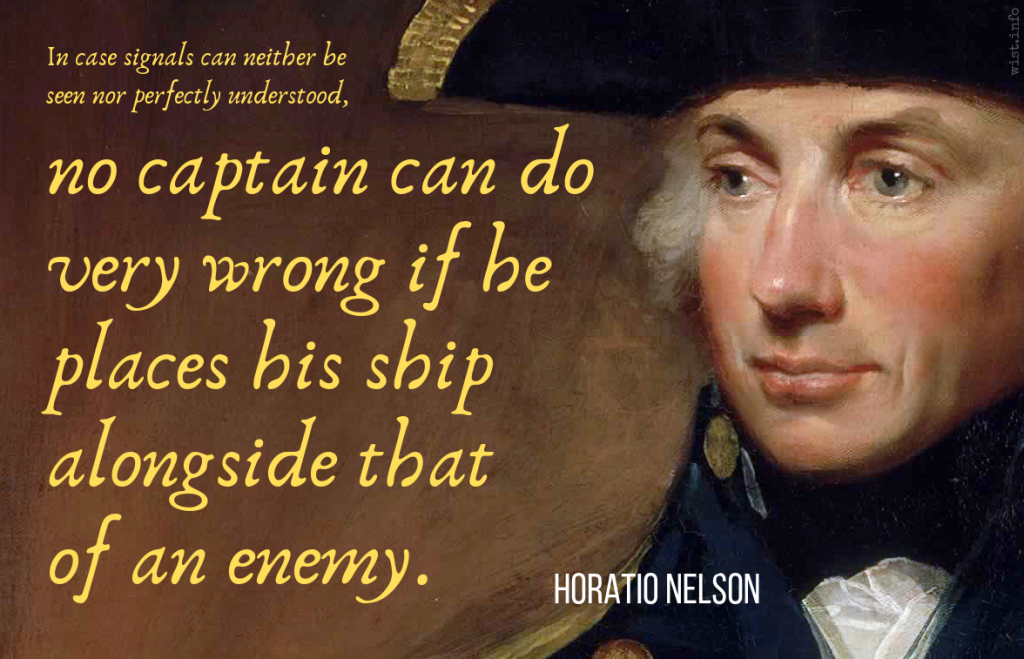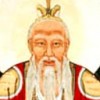The greatest crimes in the world are not committed by people breaking the rules but by people following the rules. It’s people who follow orders that drop bombs and massacre villages. As a precaution to never committing major acts of evil it is our solemn duty never to do what we’re told, this is the only way we can be sure.
Banksy (b. 1974?) England-based pseudonymous street artist, political activist, film director
Wall and Piece, “Cops” (2005)
(Source)
Quotations about:
orders
Note not all quotations have been tagged, so Search may find additional quotes on this topic.
Political loyalty, military obedience are excellent things, but they neither require nor do they justify the commission of patently wicked acts. There comes a point where a man must refuse to answer to his leader if he is also to answer to his conscience.
Hartley Shawcross (1902-2003) English barrister, politician, diplomat
Opening remarks, Nuremberg War Crimes Tribunal (4 Dec 1945)
(Source)
Shawcross was Attorney General of the UK and Chief Prosecutor for the UK at the tribunal
It is not murder which is forgiven but the killer, his person as it appears in circumstances and intentions. The trouble with the Nazi criminals was precisely that they renounced voluntarily all personal qualities, as if nobody were left to be either punished or forgiven. They protested time and again that they had never done anything out of their own initiative, that they had no intentions whatsoever, good or bad, and that they only obeyed orders.
To put it another way: the greatest evil perpetrated is the evil committed by nobodies, that is, by human beings who refuse to be persons.Hannah Arendt (1906-1975) German-American philosopher, political theorist
Lecture (1965-1966), “Some Questions of Moral Philosophy,” New School for Social Research, New York City
(Source)
This is from a series of lectures Arendt gave at the New School for Social Research in NYC (1965), and at the University of Chicago ("Basic Moral Propositions," 1966). These were reworked and collected under this title in Responsibility and Judgment, Part 1 "Responsibility" (2003).
Now the abuse of authority can be of two kinds. First, when what is commanded by the ruler is contrary to the purpose for which the ruler was appointed: for example, if some sinful act is commanded contrary to the virtue which the ruler is ordained to foster and preserve. In this case, not only is one not bound to obey the ruler, but one is bound not to obey him, as in the case of the holy martyrs who suffered death rather than obey the ungodly commands of tyrants.
Second, when what is demanded goes beyond what the order of authority can require: if, for example, a master were to exact a payment which a servant is not bound to give, or something of the kind. In this case the subject is not bound to obey; nor, however, is he bound not to obey.
Thomas Aquinas (1225-1274) Italian friar, philosopher, theologian
Commentary on the Sentences of Peter Lombard [Scriptum super libros Sententiarium], Book 2, dist. 44, quest. 2, art. 2 (1252-56) [tr. Dyson (2002)]
(Source)
Alt. trans. [Dawson]:With regard to the abuse of authority, this also may come about in two ways. First, when what is ordered by an authority is opposed to the object for which that authority was constituted (if, for example, some sinful action is commanded or one which is contrary to virtue, when it is precisely for the protection and fostering of virtue that authority is instituted). In such a case, not only is there no obligation to obey the authority, but one is obliged to disobey it, as did the holy martyrs who suffered death rather than obey the impious commands of tyrants.
Secondly, when those who bear such authority command things which exceed the competence of such authority; as, for example, when a master demands payment from a servant which the latter is not bound to make, and other similar cases. In this instance the subject is free to obey or disobey.
In case signals can neither be seen nor perfectly understood, no captain can do very wrong if he places his ship alongside that of an enemy.
Horatio Nelson (1758-1805) British admiral
Memorandum before the Battle of Trafalgar (9 Oct 1805)
(Source)
It is human nature to hate the man whom you have to hurt.
[Proprium humani ingenii est odisse quem laeseris.]
Tacitus (c.56-c.120) Roman historian, orator, politician [Publius or Gaius Cornelius Tacitus]
Agricola, ch. 42 (AD 98)
(Source)
Alt trans: "It belongs to human nature to hate those you have injured."
This subject brings me to that vilest offspring of the herd mind — the odious militia. The man who enjoys marching in line and file to the strains of music falls below my contempt; he received his great brain by mistake — the spinal cord would have been amply sufficient. This heroism at command, this senseless violence, this accursed bombast of patriotism — how intensely I despise them! War is low and despicable, and I had rather be smitten to shreds than participate in such doings.
Albert Einstein (1879-1955) German-American physicist
“What I Believe,” Forum and Century (Oct 1930)
(Source)
Einstein crafted and recrafted his credo multiple times in this period, and specifics are often muddled by differing translations and by his reuse of certain phrases in later writing. The Forum and Century entry appears to be the earliest. Some important variants:This topic brings me to that worst outcrop of herd life, the military system, which I abhor. That a man cant take pleasure in marching in fours to the strains of a band is enough to make me despise him. He has only been given his big brain by mistake; unprotected spinal marrow was all he needed. This plague-spot of civilization ought to be abolished with all possible speed. Heroism on command, senseless violence, and all the loathsome nonsense that goes by the name of patriotism -- how passionately I hate them! How vile and despicable seems war to me! I would rather be hacked in pieces than take part in such an abominable business.
— "The World As I See It [Mein Weltbild] [tr. Bargmann (1954)]This topic brings me to that worst outcrop of the herd nature, the military system, which I abjor. That a man can take pleasure in marching in formation to the strains of a band is enough to make me despise him. He has only been given his big brain by mistake; a backbone was all he needed. This plague-spot of civilization ought to be abolished with all possible speed. Heroism by order, senseless violence, and all the pestilent nonsense that does by the name of patriotism -- how I hate them! War seems to me a mean, contemptible thing: I would rather be hacked in pieces than take part in such an abominable business.
— "The World As I See It [Mein Weltbild] [tr. Harris (1934)]
One will weave the canvas; another will fell a tree by the light of his ax. Yet another will forge nails, and there will be others who observe the stars to learn how to navigate. And yet all will be as one. Building a boat isn’t about weaving canvas, forging nails, or reading the sky. It’s about giving a shared taste for the sea, by the light of which you will see nothing contradictory but rather a community of love.
[Celui-là tissera des toiles, l’autre dans la forêt par l’éclair de sa hache couchera l’arbre. L’autre, encore, forgera des clous, et il en sera quelque part qui observeront les étoiles afin d’apprendre à gouverner. Et tous cependant ne seront qu’un. Créer le navire ce n’est point tisser les toiles, forger les clous, lire les astres, mais bien donner le goût de la mer qui est un, et à la lumière duquel il n’est plus rien qui soit contradictoire mais communauté dans l’amour.]
Antoine de Saint-Exupéry (1900-1944) French writer, aviator
Citadelle [The Wisdom of the Sands], ch. 75 (1948)
(Source (French))
This looks to be the origin of the following, more common attributions to Saint-Exupery:This quotation (and variation) are discussed here: Teach Them to Yearn for the Vast and Endless Sea – Quote Investigator. That article may in fact be the source of the English translation above; the standard translation does not translate much of ch. 75 as found in the above French. It includes only:
- "If you wish to build a ship, do not divide the men into teams and send them to the forest to cut wood. Instead, teach them to long for the vast and endless sea."
- "If you want to build a ship, don’t drum up people together to collect wood and don’t assign them tasks and work, but rather teach them to long for the endless immensity of the sea."
- "If you want to build a ship, don’t drum up the men and women to gather wood, divide the work, and give orders. Instead, teach them to yearn for the vast and endless sea."
- "If you want to build a ship, don't drum up the workers to gather wood, don't divide the work and give orders. Instead, teach them to yearn for the vast and endless sea."
Instill in a people’s heart the love of sailing ships, and it will draw into itself all that is fervent in your land and transmute it into sails and rigging.
[tr. Gilbert (1950)]
BOSS KEAN: Sorry, Luke, I’m just doing my job. You gotta appreciate that.
LUKE: Calling it your job don’t make it right, Boss.Donn Pearce (1928-2017) American novelist, screenwriter
Cool Hand Luke (1967) [with Frank Pierson]
In the actual final script, the exchange goes:BOSS KEAN: Ah'm jus' doin' mah job, Luke. You gotta appreciate that.
LUKE: Boss, when you do somethin' to me you better do it because you got to or want to ... but not because it's your damn job.











